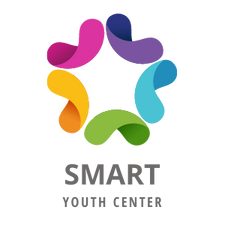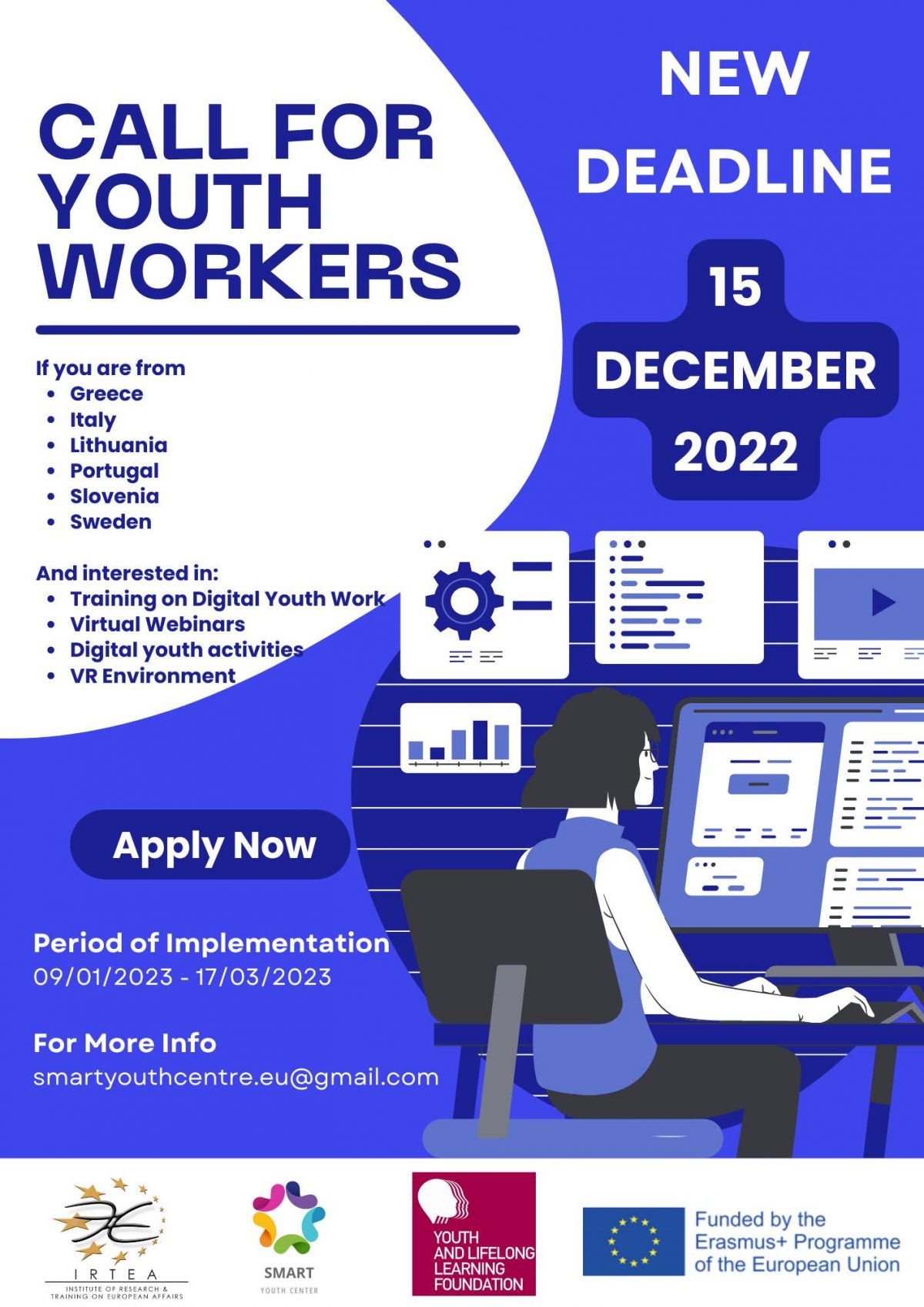We seek 30 youth workers interested in digital youth work and its aspects, to be trained and equipped in new, innovative techniques of digital youth work, using e-learning and Virtual Reality tools.
Following the development of the PR2, the Virtual Reality Platform, comes the Pilot Application with the implementation of youth activities by participants themselves (youth workers).
During the 1st PR, participants (youth workers) will follow the MOOC courses, which concern Digital Youth Work and Digital Training. After completing said trainings and the development of the VR Youth Center, participants will become active in this PR, as they will be called to implement their digital youth activities in this virtual environment.
For the essential and effective implementation of this result, the following procedure will be applied:
- Participants’ preparation
1.a. The leader-partner, with the contribution of teams of the other partners, will implement webinars (preparatory meetings) to the participants to help them understand the next stages and to provide information and support. Provision of supporting material/guides that will facilitate the content and activities’ creation, and guides with technical information regarding VR use.
1.b. Implementation of online meetings with the participants to prepare for the VR activities. Participants will split into groups and each one, with the guidance of the leading organization and the partner responsible for the VR, will take part in these online meetings, during which they will plan their activities. I.R.T.E.A. and BOLT’s presence will contribute to monitoring the applicability of everything decided from the groups.
- Implementation of pilot youth activities. After defining the activities’ content, their implementation will follow. Each group responsible for coordinating each activity will present the pilot application of the digital tool/activity decided by performing it to the rest project participants.
- Collecting activities into a Report. I.R.T.E.A. will assume the responsibility to coordinate the procedure of pilot application and to gather, describe and outline everything that will take place during the Pilot Activity. This material will be included in Project Result 4, the Toolbox. This way, the viability of the results, is ensured. These results will be available for general use and, in any case, for anyone leading an educational process using non-formal learning methods and, of course, youth workers themselves. This way, participants will experience firsthand the interactivity of a Virtual Youth Center and enjoy all the advantages that occur as a result.
- Technical Information Guide. This Guide, which will be created to reflect technical, practical information which will be useful to the next users of the VR, will be part of this project’ results.
Description of Activities
The Consortium releases a Call for Participants, aiming to identify 5 youth workers per partner’ country (Greece, Slovenia, Italy, Lithuania, Portugal, Sweden) interested in developing and enhancing their digital skills and knowledge on digital youth work. Selected Youth Workers will have to follow 4 webinars (preparatory meetings) aiming to get trained on digital youth work and their aspects and engage into online meetings for the Pilot Application, of the material developed under PR1, PR2 and PR3 up to this point.
The group of youth workers will:
Phase 1: Attend 4 Webinars (preparatory meetings), 3 hours total duration each, to help their smooth introduction to the project and understanding of its objectives and aims as well as the Project Result’s 3, which they will participate to.
During these, the youth workers will be introduced to the CEREBRUM.gr Platform for attending the MOOC Courses (Project Result 1) and the VR Application (Project Result 2) which will be the “implementation site” for their activities.
Phase 2: Participate at the Pilot Application 3 online sessions, 4 hours total duration each, in a 1-month duration.
Youth Workers will split in 6 international groups and will be called to develop their own digital youth activities, based on what they learnt in the MOOCs, to be implemented in the VR Game developed by BOLT Virtual.
The results produced during the 2 phases of this Result, will be gathered, and reflected in a Report, serving as the main deliverable of the Project Result 3.
Timeline of the Project Result 3
Call for Participants: Deadline 15 December 2022
Phase 1: 4 Webinars (preparatory meetings)
09 until 20 January 2023 (2 first Webinars, 3-hours total duration each)
Cerebrum.gr Platform follow: 23 January 2023 until 10 February 2023 (3 weeks)
06 until 17 February 2023 (2 last webinars)
Phase 2: Pilot Application
From 20 February 2023 until 17 March 2023 (1 month)
Registration Procedure
In order to express your interest in participating in the aforementioned activity please check the following link.
Deadline: 15th December 2022 by 12 p.m. EET (11 p.m. CET).
Funding
The activity is funded by the Erasmus + Programme of the European Union, via the Greek National Agency, The Youth and Lifelong Learning Foundation (INEDIVIM).
Contacts
In case you have any questions, do not hesitate to contact us at our official email at smartyouthcentre.eu@gmail.com
Description of the Project
“Support Mobility Activities Running through Tech – S.M.A.R.T. Youth Centers” project is a Strategic Partnership (Key Action 2 – KA2) of the Erasmus+ Programme funded by the Hellenic National Agency INEDIVIM (The Youth and Lifelong Learning Foundation). The project started on December 2021 and will run for 24 months under a consortium of 8 partnering organizations from 6 different European countries.
S.M.A.R.T. is the continuation of 2 previous Strategic Partnerships projects of I.R.T.E.A. (STEPS Youth Centers and the VR in School Education and Civic Participation) under the general topic of introducing and integrating new technologies in youth work.
S.M.A.R.T.’s main objectives are the following:
-The development of digital skills and competences of youth workers
-Ensuring the inclusive nature of learning opportunities
-The development of e-learning, mixed and distance learning skills
-The development of digital pedagogical skills of youth workers
-Empowering youth workers to provide high-quality, digital, non-formal inclusive education
Participants in this process will be youth workers and their main feature is that they wish to develop their digital skills in the field of Digital Youth Work (DYW). As a result, people with or without much experience in the field of Youth will be sought who are interested in gaining a background in digital tools and methodologies that will allow them to adapt their work to the new trends of digital activities in the youth field. The expected results of the project are identified in empowering and educating youth workers to be able to understand how digitization shapes societies, including its impact on education and the youth sector in general, to take into account the ‘digital culture’ of young people, to foster a more flexible culture in the adoption of digital tools in education, to design DYW actions in line with the needs and hopes of young people and to encourage the participation of young people in all phases of DYW.
Through the envisaged activities, the project aims to fulfil the following outcomes:
As tangible Project Results:
- The development of MOOC courses and their attendance by participants on various aspects and tools of DYW and Digital Training,
- The creation of VR environment for the implementation of activities aimed at young people,
- The pilot implementation of youth activities by the participants themselves,
- The creation of a Digital Toolbox containing tools, methods and applications useful in the field of Digital Education and Training based in the field of DYW.
Impact of the Project
S.M.A.R.T. project focuses on achieving a triple impact. First, it seeks to create opportunities for organizations, trainers and youth workers to innovate. Secondly, it aims at the increased use of Open Educational Resources, ensuring that educational materials produced with European or public funding are free, open and available to all for use or reuse. Finally, it seeks to improve the infrastructure of Information and Communication Technologies (ICT) and connectivity in youth centers.
Consortium Members
Institute of Research & Training on European Affairs – I.R.T.E.A. (Greece)
Zavod Mladinska Mreza Mama (Slovenia)
Change Your Life Now – Cyln (Greece)
Comune Di Cinisello Balsamo (Italy)
Vsl “Amicus Certus” (Lithuania)
Dypall Network: Associacao Para O Desenvol Vimento Da Participacao Cidada (Portugal)
Keks Stodforening (Sweden)
Private Company Bolt Virtual Services and Productions (Greece)

